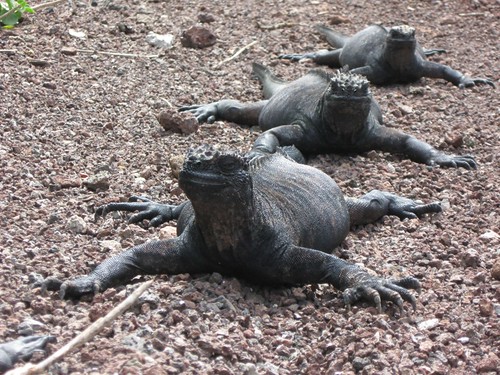
Everyday I take a 2 hour lunch. Okay, wait. Let me rephrase that...
It is customary in Ecuador that most businesses close from 12-2pm everyday. Save the restaurants. This is generally called almuerzo, which means 'lunch'. So everyday I oblige this tradition and take the time to go home, make lunch, have a coffee, read a bit and then sometimes I will take a bike ride down to the coastal street in town, aptly named Charles Darwin Ave.
Lately, we have had amazing sunny weather which makes everything glow with coastal delight. I was enchanted one day by this sea lion that was waiting so patiently for this man to throw him some fish. I swear he was thinking "c'mon dude, I swam all this way, look at my cute whiskers...okay, now I'm beggin' here!" They remind me so much of dogs. The look on their face, the barking.
They don't show up all of the time, just occasionally, so it is neat to see them. Even if it is technically out of their natural habitat. After this begging session, seen here in the picture, the sea lion laid down for a nap under the table. Surely just a charade to make the fisherman think he had moved on. Any dog owner would know better than to fall for this trick.
The great weather lately has been really appreciated, mostly, as I said, because the colours just glow here when the sun shines. It is hard to stay indoors when there is the crystal clear ocean to drown all your thoughts away. It is truly mesmerizing.
This little egret thinks the ocean is pretty cool too!
But it hasn't been all fun and games. I have been busy working on learning how to catalogue using Koha, an online open access catalogue. Elizabeth, the other librarian who is actually leaving tomorrow morning, has just finished organizing the bulk of the archives here at CDF. I have helped with this initiative by creating the records in the catalogue that will allow this collection to be searchable in Koha. This will allow access to a very important collection of documents that holds a lot of the historical institutional memory here. For anyone that has ever been involved in, well, anything remotely related to an organization will know that it is very important to know what has been done in the past so efforts or not duplicated unnecessarily in the future. It is important to build on ideas, not spin wheels.
We are very excited about these archives and already have people using the records and thinking up ideas about how their contents can influence current activities here.
Now that Elizabeth is gone, I am the only librarian left! So the adventure starts! It's sink or swim!
But it hasn't been all fun and games. I have been busy working on learning how to catalogue using Koha, an online open access catalogue. Elizabeth, the other librarian who is actually leaving tomorrow morning, has just finished organizing the bulk of the archives here at CDF. I have helped with this initiative by creating the records in the catalogue that will allow this collection to be searchable in Koha. This will allow access to a very important collection of documents that holds a lot of the historical institutional memory here. For anyone that has ever been involved in, well, anything remotely related to an organization will know that it is very important to know what has been done in the past so efforts or not duplicated unnecessarily in the future. It is important to build on ideas, not spin wheels.
We are very excited about these archives and already have people using the records and thinking up ideas about how their contents can influence current activities here.
Now that Elizabeth is gone, I am the only librarian left! So the adventure starts! It's sink or swim!








